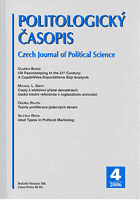UN Peacekeeping in the 21st Century: A Capabilities-Expectations Gap Analysis
UN Peacekeeping in the 21st Century: A Capabilities-Expectations Gap Analysis
Author(s): Oldřich BurešSubject(s): Politics / Political Sciences
Published by: Masarykova univerzita nakladatelství
Keywords: Peacekeeping; United Nations; capabilites-expectations gap
Summary/Abstract: This article presents a capabilities-expectations analysis of United Nations (UN) peacekeeping. I use the capabilities-expectations gap analytical concept to examine and compare the actual UN peacekeeping capabilities and expectations in the post-Cold War era, and to assess the feasibility of two basic options for closing the large gap that has developed between the two since the early 1990s – a UN capabilities increase and/or a UN expectations decrease. I argue that as long as UN Member States continue to be unwilling and/or unable to provide political leadership, instruments and resources commensurate with the daunting tasks of peacekeeping and peacebuilding, a UN expectations decrease will remain the only feasible option for closing the gap between UN capabilities and expectations. As in the past, this means that the UN will constantly be forced to make Faustian choices between the quantity and quality of its peacekeeping operations. In the 21st century, however, the repercussions of both of these choices are likely to be more formidable than ever before. If UN peacekeeping suffers another high-profile failure because of a Rwanda-like inaction or a Srebrenica-like inadequate action, the UN’s collective security role is bound to be significantly eroded not only through a combination of limited resources and its Member State conflicts, but also by a substantially increased involvement of various non-UN actors, and by a growing sense of the limits of what can be expected of the UN.
Journal: Politologický časopis - Czech Journal of Political Science
- Issue Year: XIII/2006
- Issue No: 4
- Page Range: 379-398
- Page Count: 19
- Language: English

